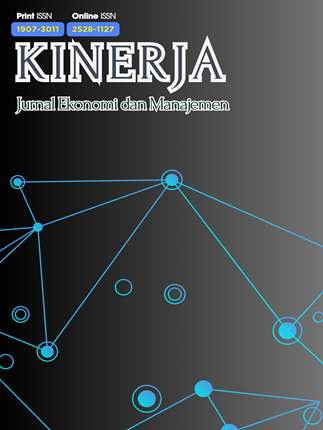The Effect of Ability and Motivation on Organizational Citizenship Behavior
DOI:
https://doi.org/10.30872/jkin.v21i2.15321Keywords:
Ability, Motivation, Organizational Citizenship BehaviorAbstract
The purpose of this study is to analyze the direct influence of Ability and Motivation on OCB and police personnel performance. In addition, it is also to analyze the indirect influence of Ability and Morphation through OCB on the performance of police personnel. The respondents studied were 70 police personnel who worked in the Samarinda Police Criminal Investigation Unit. The analysis model used in this study is Path analysis. The results of the study concluded that Ability had a significant positive effect on OCB. Motivation had a positive but not significant effect on OCB. The direct influence of Ability and Motivation as well as OCB is positive and significant on Performance. But indirectly, Capability and Motivation through OCB have a not significant effect on the performance of personnel of the Samarinda Police Criminal Investigation Unit.
References
Algifari, 2000. Regression Analysis: Theory, Cases and Solutions. Yogyakarta: BPFE Gajah Mada University
Analisa, L. W., & RAHARDJO, M. (2011). Analysis of the influence of work motivation and work environment on employee performance (Study on the Semarang City Industry and Trade Office) (Doctoral dissertation, Diponegoro University).
Annisa, Sri, 2015. The Effect of Organizational Citizenship Behavior (OCB) on Employee Performance at PT Telkom Blimbing Malang
Ghozali, Imam, 2005. Application of Multivariate Analysis with SPSS Program. Diponegoro University Press, Semarang.
Robbins, Stephen P, 2006. Organizational Behavior Volume II, Translation of Hadayana Pujaatmaka, Jakarta, Prenhalindo.
Prawirosentono, Suryadi. 2007. Employee Performance Policy. Yogyakarta: BPFE
Ricky Fajar Adiputra, 2007. "The Effect of Education, Training and Competency on the Performance of Criminal Investigation Unit Members at the Lampung Metro City Police" Thesis, University of Lampung.
Siti Mujinah, 2017. Employee Competence, Emotional Quotient and Self Efficacy Influence on Organizational Citizenship Behavior and Employee Performance at Indomobil Group in Surabaya. Jrem , Volume 17 No. 1 January 2017. Seventeen August University of Surabaya.
Sugiono, S., Noerdjanah, N., & Wahyu, A. (2020). Test the validity and reliability of the SG posture evaluation measuring tool. Journal of Physical Therapy, 5(1), 55-61.
Tuti Tursinah, 2002: "The Influence of Motivation and Work Ability on Human Resource Performance at the Regional Research and Development Agency of West Java Province. Thesis of the Master's Education Program in the Social Sciences Study Program in the Field of Public Policy Studies.
Taba, M. I., Asdar, M., Parawansa, D. A. S., Hakim, W., Yassi, A. H., Salle, I., & Razak, S. R. (2023). The Relationship between Socioeconomic Factors and Household Income Levels in Coastal and Island Communities in South Sulawesi. International Journal of Professional Business Review: Int. J. Prof. Bus. Rev., 8(9), 7.
Wijaya, Tony & Jati, S. Panca, 2007. The Effect of Organizational Citizenship Behavior on the Performance of Yogyakarta Police Personnel Performance Multiple Regression Analysis Model.
Wawan Gunawan, 2013. The Effect of Organizational Commitment, Competence on Employee Performance with Job Satisfaction Mediation and Organizational Citizenship Behaviorp at the Regional Revenue and Asset Management Office of Central Java Province, Juornal Postgraduate Students, Juornal Management Unis Bank Malang.


